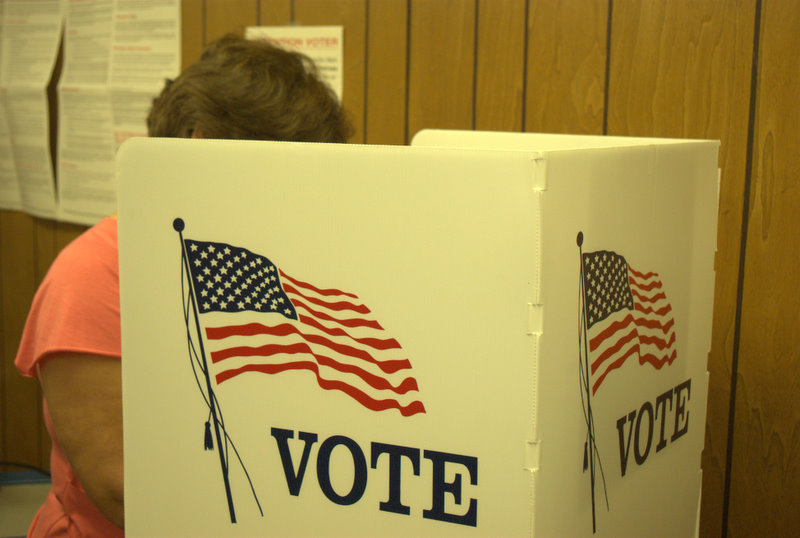Candidates are getting creative in how they connect with voters amid a COVID-19 pandemic. With about a week left before the primary election, some candidates are leaning on phone calls, text messages and social media more than usual in lieu of in-person campaign rallies or forums, even as tens of thousands of voters have already cast ballots through absentee or early in-person voting.
Brett Phelps, a Democrat who is running for district attorney in the state’s 4th judicial district said a lack of face-to-face interaction with voters is one of the biggest challenges. Phelps, a criminal defense attorney, normally could have a more personable conversation with voters to make his pitch about why his experience on the defense side is better than his opponent who has worked for years in the DA’s office. He said, instead, he has been focusing on putting up campaign signs and making phone calls.
“One of the hardest things, when we do have personal interactions, is not shaking hands,” Phelps said. “Shaking hands and kissing babies, that’s what they told me it was all about when I got into this.”
Even when asking supporters to display one of his yard signs, Phelps said, he has to make a phone call first instead of knocking on doors.
But, it is those person-to-person conversations that political hopefuls often count on that makes things the most difficult.
“Not being able to meet with people face-to-face and answer their questions personally has definitely been a struggle,” Phelps said.
Even walking door to door in more urban areas can present problems during a pandemic, said state House Republican candidate Jill Michel. She is running against one other person in her primary race. Michel said simply knocking on doors this year presents new complications.
“You never know what you’re going to get, you may get somebody with a mask who’s like, ‘Please stay 12 feet away from me,’ or you’ll get people who are outside having barbecues in their front yard,” Michel said.
She said in the days before the primary election she plans to walk her district with volunteers to leave contact cards on front doors instead of potentially turning off voters with in-person visits to their respective homes.
But, she said, even over the phone it is hard to gauge who is financially struggling when she’s soliciting donations.
“I don’t know if these people are essential workers that are still getting a paycheck or someone who hasn’t been paid in two months,” Michel said. “So it’s really hard to be like, ‘Hey, can you spare 25 bucks for my campaign?’”
Michel’s primary opponent, Robert Godshall, ran unsuccessfully for the same seat in 2018, but with more than $18,000 carried over from the previous campaign, his cash on-hand dwarfs Michel’s $7,000. But Michel has outspent Godshall. According to the most recent campaign finance reports, Michel’s campaign has opted to focus on paid social media ads and yard signs.
But money spent and raised in legislative or local races are a far cry from that of congressional candidates.
John Blair, who has years of experience working on campaigns said he had to “pivot” his campaign for the state’s 3rd Congressional District when COVID-19 cases started to rise in March. He said he quickly shut down his campaign offices and started to focus on connecting with voters online. Luckily, he said, that was before his campaign spent money on the tried and true bumper stickers and yard signs.
“In the end we’re grateful we didn’t spend that money on that because there really are not people driving around looking at bumper stickers or yard signs right now,” Blair said.
Instead, the Blair campaign has focused on engagement through online game nights and live videos of him and his husband.
“It’s just frankly 30 minutes of ‘Let’s try to make people laugh, let’s be a distraction from all the other horribleness that’s going on right now and give people a chance to get to know [husband] Billy and me on a personal level,” Blair said.
And, as is usually the case, television ads have played a major part in that race for Blair and his opponents. Two of his opponents, Valerie Plame and Teresa Leger Fernandez, along with Blair have been running highly produced television ads. But in one of Blair’s ads he published his phone number and encouraged voters to call him anytime, which he said people have. He estimated up to four calls or texts a day, sometimes just to verify that he’ll actually respond—which he said he does. The state’s primary election is June 2 and while in-person voting locations will still be open, New Mexico Secretary of State Maggie Tolouse Oliver is encouraging voters to vote by mail. Her office sent forms for eligible voters to apply for absentee ballots. Voters can also apply for an absentee ballot at http://nmvote.org/.


















